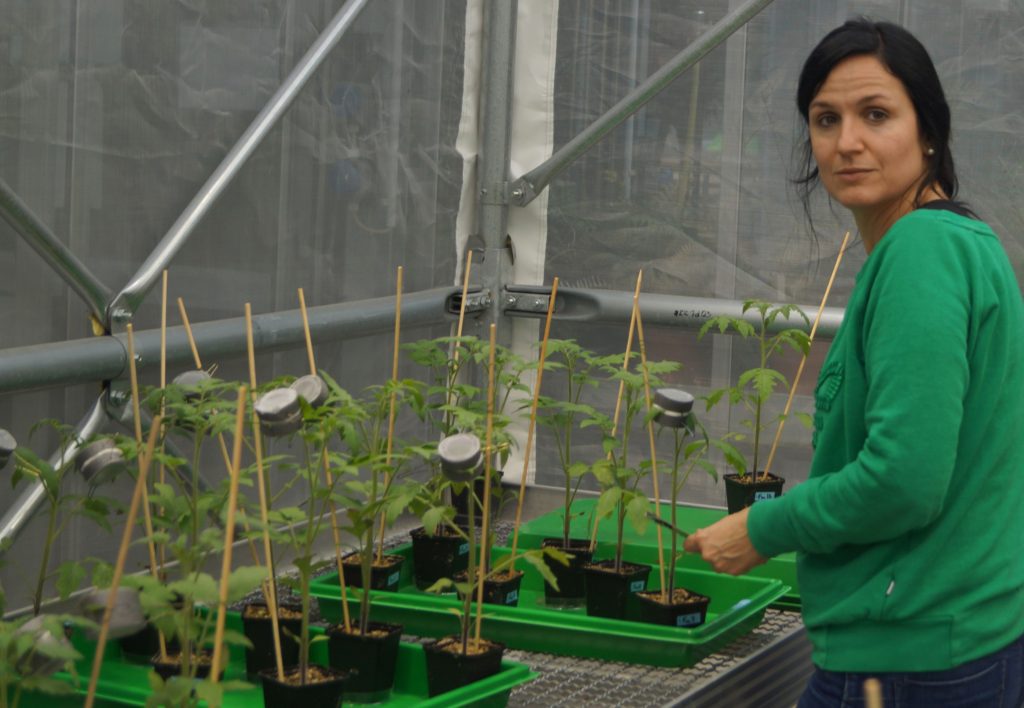Nov 22, 2016Tomato nematode resistance aided by a fungus
Plants are constantly challenged by hungry animals and infectious microbes. For tomato plants, major enemies are nematodes of the species Meloidogyne incognita. These are little worms that first induce the roots to form galls, which they then inhabit, feeding on the plant tissue. The plants’ problem is: they cannot run away from their attackers. However, they have other means of defending themselves, namely chemical substances that are toxic or deterrent to the parasitic nematodes. The production of these compounds in the plant is tidily regulated by small hormones, like salicylic and jasmonic acid.
Not all interactions with other organisms are detrimental for plants, however – some can be beneficial. For example, associations between specific microbes and plant roots. Similar to microbial communities in the human gut, microbial communities associated with roots can provide their hosts with essential functions related to nutrient acquisition and protection against infections. One example for such an association has now been reported by an international team of researchers in the journal New Phytologist: a fungus of the genus Trichoderma lives inside the tissue of tomato plants (endophytically) and helps its host to defend itself against infestations by parasitic nematodes.
“The fungus boosts plant immunity by enhancing the production of toxic chemical compounds upon nematode attack. This limits the invasion of the roots by nematodes, reduces the nematodes’ fecundity and compromises the formation of root galls,” Ainhoa Martinez-Medina, first author of the study and scientist at the German Centre for Integrative Biodiversity Research (iDiv) and the Friedrich-Schiller-University Jena (FSU), said in a news release.
To investigate the complex interactions between the tomato plants, the fungus, and the nematodes, the researchers have used a sophisticated study design in the laboratory. Half of the roots of their test plants were grown in one pot, and the other half in another pot. This allowed the scientists to test different combinations of their experimental treatments, namely infestation with nematodes versus no infestation, and association with fungus versus no association. Subsequently, marker genes involved in pathways modulated by salicylic and jasmonic acid were investigated. The results show that the Trichoderma fungus “primes” the plant, which can then defend itself faster against nematodes.
“Such a ‘priming’ is comparable to a vaccination for us humans, through which our immune system learns and subsequently can react more effectively to an infection,” said Martínez-Medina.
In the future, the knowledge about beneficial fungi could also help to develop sustainable solutions for agriculture, the scientist said: “Inoculants based on these beneficial microbes help to ‘immunize’ the plants against pathogens and pests, thereby reducing yield losses due to infections, in a sustainable way.”
Interestingly, the fungus-induced resistance is a plastic phenomenon. This means that it adapts according to the stage of the nematode infection: in the beginning, the fungus boosts salicylic-dependent defenses in the roots, leading to higher resistance against the nematode invasion. Subsequently, during the nematode feeding stage, the fungus increases plant defenses regulated by jasmonic acid, leading to reduced nematode development and reproduction.
– Ainhoa Martínez-Medina, German Centre for Integrative Biodiversity Research (iDiv); Friedrich Schiller University Jena















